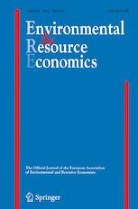Information, consequentiality and credibility in stated preference surveys: A choice experiment on climate adaptation
Information provided in valuation surveys has been shown to affect stated preferences, which in turn may matter for the validity and reliability of survey-based value estimates. Although information effects are widely documented in stated preference studies, the reasons underlying the effects are less established. The authors focus on information about the policy context of the valuation scenario and examine two pathways which may help explain how including such information in a survey affects stated preferences. They hypothesize and empirically analyze whether the information effects on stated preferences can emerge as a result of changed perceptions about
- (1) the survey consequentiality and
- (2) the credibility of the valuation scenario upon facing the additional information.
The results confirm that the frequently found information effects can be present in the context of urban green and climate adaptation. The role of the additional information appears to be negligible for consequentiality perceptions. In contrast, the additional information strengthens the perceived credibility, and this may partially explain the information effects on stated preferences. The authors conclude that stated preference research may benefit from an increased attention to perceived credibility of the valuation scenario.



